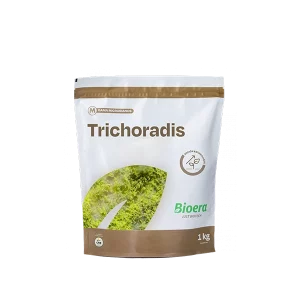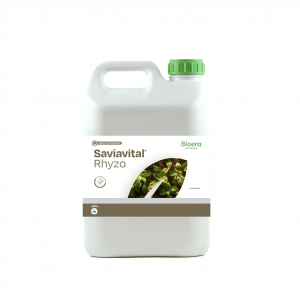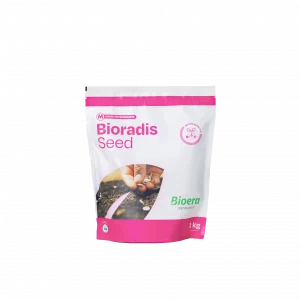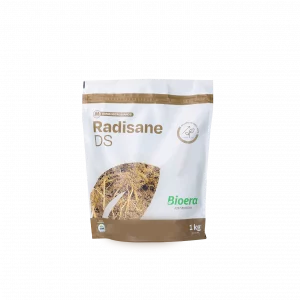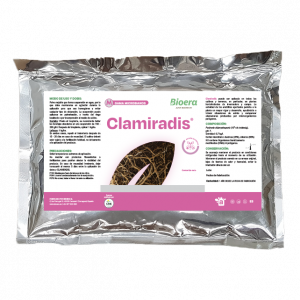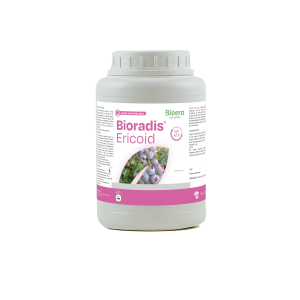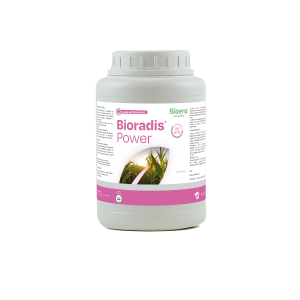Microbial fertilizers have emerged as an innovative solution in the world of modern agriculture, as proper crop nutrition is essential to ensure productivity and quality. Farmers must stay informed about the most advanced techniques to optimize their agricultural practices and improve crops, while also caring for the environment.
These fertilizers not only improve plant health but also contribute to soil regeneration and promote a more balanced and resilient agricultural system.
Below, we explain in detail what microbial fertilizers are, how they work, and why you should consider using them in your crops to achieve better results.
What are microbial fertilizers?
Microbial fertilizers are products containing beneficial live microorganisms, such as bacteria and fungi, that act directly on the soil and plants to enhance their ability to absorb nutrients. Unlike traditional chemical fertilizers, which only provide nutrients directly, microbial fertilizers create a favorable ecosystem in the soil, naturally and sustainably boosting its fertility over the long term.
The microorganisms in these fertilizers play crucial roles, such as:
- Fixing atmospheric nitrogen in the soil.
- Solubilizing phosphorus.
- Producing hormones and enzymes that stimulate plant growth.
- Increasing plant resistance to pests and diseases.
- Decomposing organic matter to release plant-available nutrients.
Types of microorganisms in microbial fertilizers
Microbial fertilizers include a variety of specialized microorganisms, each playing key roles in improving soil and plant health. Among the most common are:
- Nitrogen-fixing bacteria: Well-known examples include bacteria such as Rhizobium and Azotobacter, though other genera also have this capability. These bacteria are essential for converting atmospheric nitrogen into plant-absorbable forms like ammonium or nitrates. This is particularly important in crops where nitrogen-fixing bacteria can reduce the need for synthetic nitrogen fertilizers.
- Mycorrhizal fungi: These fungi form symbiotic relationships with plant roots, extending their hyphal network beyond the root absorption zone and facilitating nutrient uptake, such as phosphorus. Mycorrhizae also enhance plant tolerance to drought and environmental stress.
- Phosphorus-solubilizing bacteria: Phosphorus is a vital nutrient, but in many soils, it exists in insoluble forms that plants cannot use. Bacteria such as Bacillus and Pseudomonas help transform this phosphorus into plant-available forms, optimizing nutrition.
- Plant growth-promoting microorganisms (PGP): This term also encompasses the microorganisms mentioned above. They produce natural hormones like auxins and cytokinins that promote plant development, improve seed germination, and stimulate root growth. They can be endophytic (capable of colonizing plant tissues) or simply remain in the rhizosphere.
Benefits of using microbial fertilizers in agriculture
Using microbial fertilizers offers multiple advantages for both farmers and the agricultural ecosystem. Below are some of the most important benefits:
1. Improved nutrient use efficiency
Microbial fertilizers enable plants to absorb nutrients more efficiently. This means farmers can reduce the amount of chemical fertilizers applied without compromising crop yields. Additionally, by using microorganisms that enhance nutrient availability, the likelihood of nutrient leaching or volatilization is reduced, contributing to greater sustainability.
2. Soil regeneration
One of the main problems of intensive agriculture is soil degradation, which reduces its natural ability to retain nutrients and water. The microorganisms in microbial fertilizers help restore soil structure, improving water retention capacity and promoting greater biodiversity in the underground ecosystem. Healthier soils are key to ensuring the long-term productivity of any agricultural system.
3. Reduced dependency on synthetic fertilizers
Continuous use of chemical fertilizers can impoverish soil and lead to environmental contamination. Microbial fertilizers provide a more natural and sustainable alternative, reducing the need for external chemicals and helping to mitigate issues such as nitrate leaching and pollution of nearby water bodies.
4. Increased resistance to diseases and pests
Beneficial microorganisms not only improve plant nutrition but also play a significant role in protecting against pathogens and pests. They can produce metabolites that harm the phytopathogen or compete with it for nutrients. By strengthening plants’ natural defenses, microbial fertilizers reduce the need for chemical pesticides, benefiting both plants and the agricultural ecosystem.
5. Adaptability to different crops and conditions
Another key advantage of microbial fertilizers is their versatility. They can be applied to a wide variety of crops, from cereals and legumes to fruits and vegetables. Additionally, microorganisms can adapt to different soil types and climatic conditions, making them a viable option for almost any agricultural enterprise.
6. Enhanced tolerance to abiotic stress
Some microorganisms produce enzymes such as ACC deaminase. This enzyme breaks down ACC (1-aminocyclopropane-1-carboxylic acid), preventing tissue oxidation during stress events caused by ethylene production. Under drought or high salinity conditions, microorganisms with this potential are a great ally.

The importance of balanced plant nutrition
Proper nutrition is one of the fundamental pillars for achieving healthy and productive crops. However, many farmers do not pay enough attention to the quality of the fertilizers they use or the specific needs of their soils and plants. Using microbial fertilizers not only ensures that plants receive essential nutrients but also contributes to balancing those already present in the soil and creating a more sustainable agricultural environment.
1. Better yield and product quality
Well-nourished crops not only yield more but also produce higher-quality food with greater nutritional content and better taste. Additionally, well-fed plants are more resistant to adverse conditions such as drought or pests, resulting in fewer economic losses for the farmer.
2. Long-term sustainability
By using microbial fertilizers, farmers invest in soil health, ensuring sustained productivity over time. Soils with rich microbial biodiversity are more resistant to erosion and depletion, ensuring that future generations of farmers can continue cultivating these lands without relying on unsustainable practices.
How to apply microbial fertilizers to crops
Proper application of microbial fertilizers is key to maximizing their benefits. Below are some basic tips for their use:
- Soil incorporation: Most microbial fertilizers should be applied directly to the soil, either through irrigation or by mixing them with the substrate. It is important to ensure that microorganisms have direct contact with roots to maximize their effect.
- Moisture conditions: Soil moisture is crucial for the success of microbial fertilizers. Ensure that the soil is adequately moist to facilitate microorganism colonization.
- Compatibility with other products: It is advisable to avoid simultaneous use of chemical pesticides or fungicides that may affect beneficial microorganisms. If such products are necessary, consult an expert to ensure compatibility.
Our Microbial Fertilizers
Discover our wide range of microbial fertilizers:
Conclusion and some recommendations
Microbial fertilizers represent an advanced and sustainable solution for crop nutrition. By incorporating beneficial microorganisms into the soil, they not only improve nutrient uptake but also promote soil health and contribute to more environmentally friendly agriculture.
For any farmer committed to the future of their land, using microbial fertilizers should be a priority. It is an investment not only in current productivity but also in the long-term sustainability and viability of agricultural activity.
Final recommendations:
- Conduct a soil analysis to understand nutritional deficiencies before applying any fertilizer.
- Consult an agronomy specialist to select the most suitable microorganisms for your soil type and crop.
- Remember that results with microbial fertilizers are gradual and long-term, so maintaining consistent use is important.

